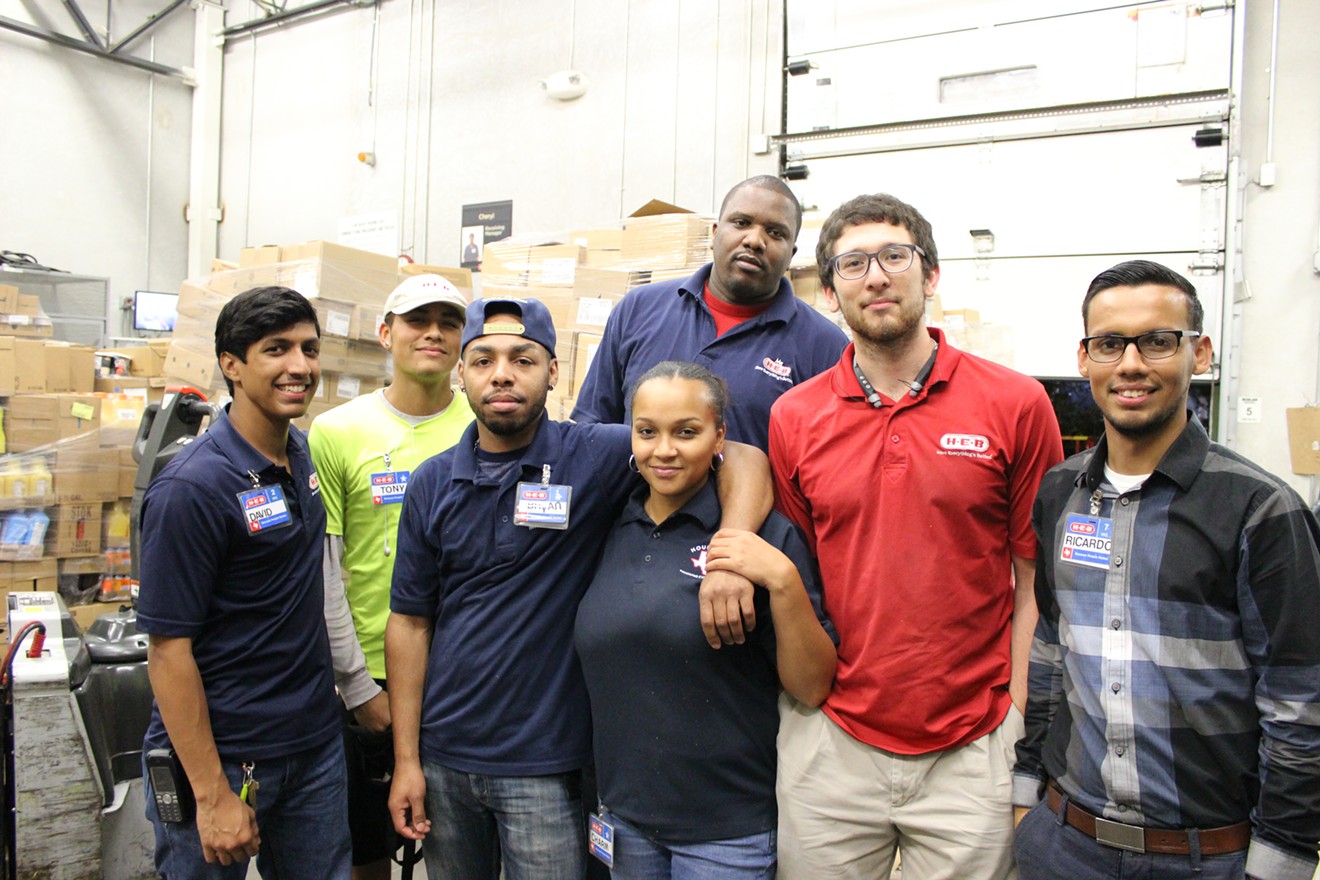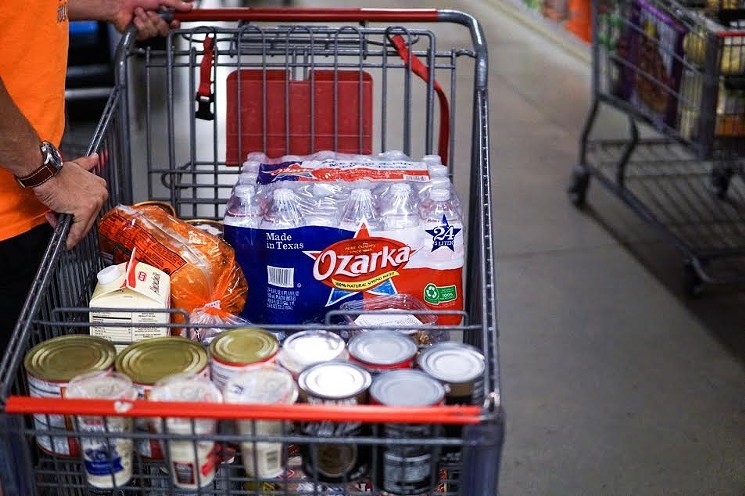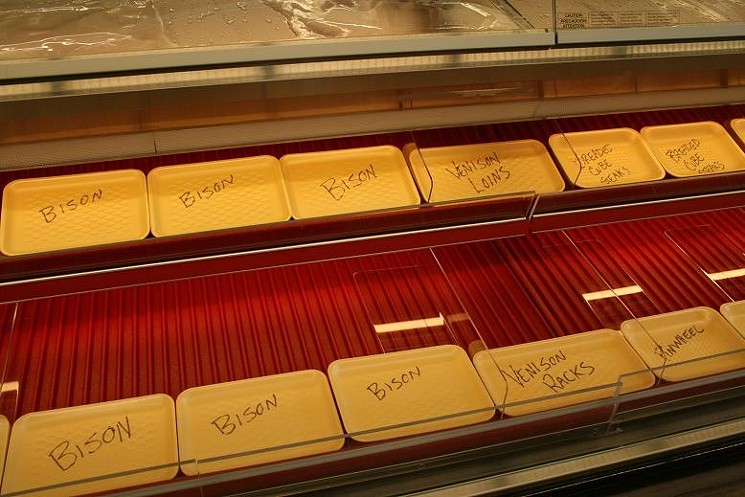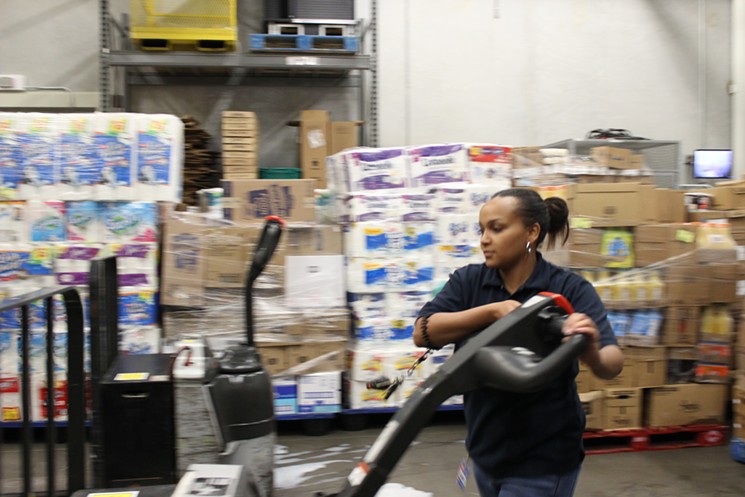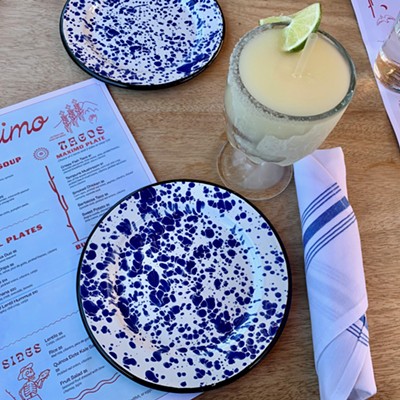When you ask manager Ricardo Estrada what his job is at the H-E-B Buffalo Market, 5225 Buffalo Speedway, he’ll be the first to tell you that he’s a bit of an everyman. Upbeat and congenial, the lanky University of Houston graduate, whose wife also works for the company, is exactly the type of person you’d want to have in charge, if say, you ever got stuck in a grocery store for a night. In this case, that night happened to be when Hurricane Harvey rolled through Houston, unloading its deluge of flood waters on the city. It was Saturday, August 26, and earlier in the day, it hadn’t rained as much as the city had expected. Then night came.
“We were closing the store at 9 p.m. We had a few customers, not that many.”
Estrada and his own managers and store director had worked tirelessly to get everyone home as safely as possible earlier in the evening. A night crew had come on early, to get their work done receiving trucks and stocking shelves, attempting to get ahold of what had to be done after working some of the busiest days the grocery store had ever seen.
Thursday and Friday at the store had meant 20 lines of customers, hundreds deep, backed all the way from the registers to the ends of grocery aisles all day. Still, people had been extremely nice to the H-E-B employees, “partners” as they’re called, and extremely appreciative. By Saturday night, most of the 330-deep staff had gotten home safely when closing time rolled around.
“There were 11 of us,” Estrada says. “By 9 p.m. it was just, like, there was no way we were going to get out of here.”
Beyond the windows, out in the empty parking lot, the rain had started to come down with the ferocity of those giant dump buckets in a water park splash zone. The 11 partners inside included the usual night crew— Charmaine Andrepont, a receiver who usually worked alone on the dock, receiving trucks and unloading and organizing pallets in a manner that would put any Tetris whiz to shame; she’d left her nine-year-old son with his grandma. There was wise-cracking night stocker Nick Larralde and stock controllers Terrance “T-Bone” Moore, a quiet guy built like a Texan linebacker, and Bryan Sylle, a gregarious type who’d also gone through Katrina in his hometown, New Orleans.
Then there were three partners who were under 18, one in grocery service, one from deli, one from bakery, who’d all been informed by their parents that the streets were too flooded for them to attempt to come home. Two couldn’t be picked up. One was forbidden from driving. Safer at the H-E-B : that was the consensus.
“I was really concerned for them,” Estrada says. “I was having them contact their parents every hour. Video chat with them, so we knew everything was okay.”
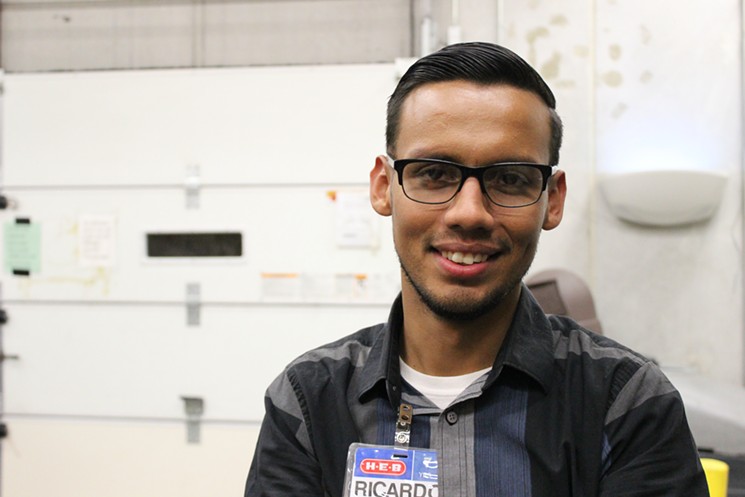
Ricardo Estrada helped his employees through three days of being stranded at HEB.
Photo by Gwendolyn Knapp
It was pretty much imperative that they did work just to stay warm. They worked their butts off for hours, stocking a truck that had come in that day, getting shelves in order, cleaning and organizing— what they call “facing the store,” getting it ready for customers. Many of them were doing jobs they’d never done before. Management gave them the go ahead to eat and drink what they wanted. Estrada fired up the ovens in the deli area with the help of his deli employee and cooked lemon pepper chicken and fried rice for the crew. But when it came time, in the early morning hours, after the urging of numerous managers’ calls and texts, to get some rest, the team found it nearly impossible to find a comfortable spot.
“It was just so cold,” Andrepont says. “Whew, lord.”
She herself laid down on pallets for a couple hours, but found it no use. She also made a makeshift nest of paper towels in a grocery aisle, where she could lie down and text or Facetime with her son and family. While the six-foot-seven T-Bone took over a manager’s office, putting cardboard in the windows to block out the light, Lynne made a veritable sleeping fort out of black plastic pallets in the back of the store, topping it with a few random H-E-B banners he'd found in an office and lining the bottom with market coats, similar to doctor’s coats. He also threw one on top of himself to stay warm. He slept for nearly six hours. “Like a baby,” he told Estrada when he awoke. Others weren’t so lucky. David Mendonca snapped a photo of the dozen Starbucks bottled Frappucinos he’d ingested, empty and lined up near the register like bowling pins.
When morning light came, the three youngest partners were able to leave. But the seven others and their supervisor Estrada stayed on to work. Some had flooding. Some had no electricity. Some had no damage, but knew they could not get home due to inaccessible highways.
By that time, it was also evident that the produce section had taken on a bit of water, not from flooding, but from an overflowing gutter attached to the building. They worked even more to clean up the area. By Sunday evening, they’d faced the store yet again in hopes that they could reopen on Monday. Customers had been circling in cars all day, and Estrada had turned away a few who’d come to knock on the doors despite signs in the windows explaining the closure, the lack of staff.
Sunday came and went, and the eight person crew was facing another night spent in the store, when their boss Brenda Lynch called from Cypress, telling them to take the corporate car to the closest hotel, a Courtyard Marriott a block away.
They grabbed toothbrushes and toothpaste. Snacks galore. Some used it as a chance to try unusual foods. For Larralde, that meant trail mix. For Sylle, it was raspberry and pineapple preserves.
“It was like Supermarket Sweep,” he jokes. “Preserves are good. The pineapple is a little chunky, but real creamy and sweet.” He ate them straight out of the jar.
“Not even any bread,” T-Bone adds.
While the guys stuck to one room, Andrepont got her own. “It was down to the point of having to handwash my own clothes,” she says. “But they had an iron and a hair dryer in there. I knew what to do.”
The crew returned to H-E-B on Monday morning, believing they could reopen. There were cars circling the lot. People lining up at the doors, but it still wasn’t safe enough for a feasible amount of H-E-B employees to get there and open. Lynch, who lives in Cypress, tried to drive in but couldn’t find a way. “You had 99 flooded. The Beltway was flooded. 10 was flooded. I tried 290 but couldn’t make it that way either.”
For many H-E-B employees, the week after Harvey would actually be spent working in stores they didn’t normally report to, those closer to their homes, though they didn’t know that yet. Even at Buffalo Speedway, the store would take on many of Meyerland's 90 partners with that location closed indefinitely, and many more partners would come in from out of town to help getting Houston's H-E-B locations back on their feet.
The skeleton crew worked alone again all day Monday, culling the produce, tossing out fruits and veggies past their prime, going through the meat and dairy sections and doing the same. Cars circled in the parking lot, a line had even formed at the door, but Estrada talked to customers and explained there would be no way to open because there weren’t enough people to even check them out. The store, at that point, was being held together by night stockers, a receiver, and their trusty leader, all of them separated from family, all of them sacrificing their own personal lives to get the store ready for customers. Still, morale never waned. The crew played cards, took breaks to eat, to talk.
“I mean, Ricardo can cook,” Andrepont says. “He made us all sorts of good food. Wings. Fries. It was good.”
Estrada also cooked loaves of bread from the bakery. “We all were doing a little bit of everything,” he says. “We were staying busy. We didn’t want to have that feeling of being stranded. And we didn’t. Throughout the entire time we were positive.” Except concerning one minor detail. The piped-in music over the loud speaker. That, they decided, could be turned off for once.
After facing the store again and cleaning, the crew departed for the hotel once more on Monday night. A call came from Lynch early on Tuesday morning.
“Are you guys ready to open the store?” she asked Ricardo.
They were ready. They pulled up once again in the corporate car and headed for the door, passing customers pleading with them to be let in. Word had already spread that other grocery stores in the area, including H-E-B locations, were only letting in handfuls of people at a time as a means of crowd control.
“I just took one look at them,” Lynch says of the customers. “It was raining. They were all huddling together with their umbrellas, and I said, 'We have to let them all in.'”
The Buffalo Speedway store was special in that regard because the size of the parking lot actually contained the crowd, and it got no busier really than it did on a crazy Saturday or Sunday. Despite the stresses of Harvey, Lynch says, the customers were “almost even calmer and even more appreciative than they had been on Thursday before the storm."
“Every 30 seconds you’d hear it,” Estrada says. “It didn’t matter what section you were in, produce, at checkout. Customers were telling all our partners thank you.”
Customers also broke out in applause five times that day, once solely for the crew that had kept the store ready to go since Saturday night. What’s more, those very employees, including Andrepont, kept working throughout Tuesday until they were asked, ever so politely, to please go home and get some sleep.
“I was at checkout,” Andrepont says, “and there was a woman who came through that spent $700. She was buying all sorts of home items. A hair dryer. A flatiron. She said she lost everything she had and they had to start over. Then she asked if I’d been home yet and I said no. And she said, 'Well, I hope when you get there, it’s okay.'”
After essentially working from 2:30 p.m. on Saturday to 4:30 p.m. on Tuesday, Andrepont did get home and it was okay. Her son was excited to see her, asking her how her week was, and also asking, “Are they going to pay you extra? Can we go to Game Stop?”
“That was his first question,” Andrepont says, laughing. H-E-B did pay her extra, along with the entire crew that got stranded — time and a half, including the hours they’d spent at the hotel — though she wouldn't know that until her next paycheck. She told him she did not, in fact, want to go to another store at that very moment or any time soon. She lay down on the bed. I’m just going to lie here next to you, her son said.
“He always knows what to say to get his way,” she jokes, but together again, side by side, they slept.

